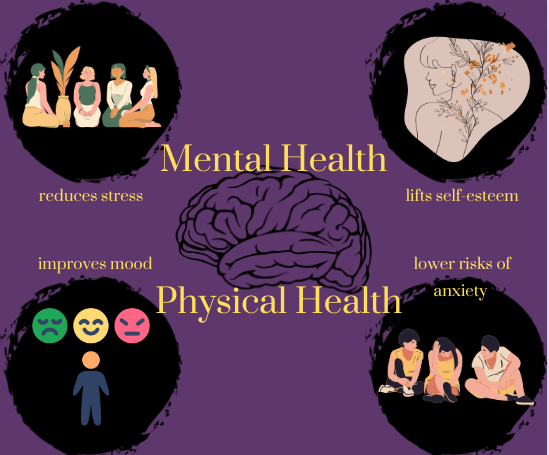Mental Health Impacts Physical Health

A chart that shows how mental health and physical health are connected.
February 23, 2023
A person’s mental state doesn’t only affect their mood and emotional well-being but also their mind and body. Data proves that good mental health can have a direct and positive effect on physical health, while poor mental health can have a negative effect on physical health. Mental health has been an ongoing argument for years. A person’s mental state can affect how they respond to certain situations or how someone acts toward others. Some remain the same, some react by distancing themselves from those close to them, and others become violent.
Poor Mental States Have Negative Impacts
Mental health has an impact on a person’s entire body. Research reveals that severe and chronic mental health issues can decrease life expectancy.
A person’s digestive system can be affected by their mental state. This isn’t referring to feeling “butterflies in the stomach” or feeling nauseous when nervous. Studies show that chronic depression, stress, and anxiety can change the physiology of the digestive tract; this affects the way it functions. In some cases, this intensifies pain and discomfort.
Chronic depression and stress can also affect a person’s ability to sleep. With a lack of sleep, symptoms of anxiety, stress, and depression can amplify. This, in turn, makes it even harder to fall asleep and stay asleep. Eventually, this can contribute to sleep disorders such as insomnia and sleep apnea.
There are a variety of factors, including high blood pressure, increased and sustained heart rate, and calcium build-up, that can increase a person’s risk for heart disease. All of these factors can be impacted by the person’s mental state. Over time, high levels of chronic depression, stress, PTSD, or anxiety may increase a person’s risk of developing heart disease. When a person is in a state of extreme stress, the body immits the hormone, cortisol, which causes a spike in blood pressure and heart rate.
Smoking also has an impact on a person’s mental and physical health. A lot of people with mental health conditions believe that smoking relieves symptoms. However, the relief is only short-lived. Eventually, smoking can even worsen a person’s symptoms.
Healthy Mental States Have Positive Impacts
While physical activity helps to keep a person physically healthy, it also improves their mental well-being. Exercise releases “feel-good” chemicals, endorphins, in the brain. Even a short ten-minute walk can improve mental alertness, energy, and mood. More specifically, finding an activity that is enjoyable can reduce stress levels, increase focus, and give a person a sense of purpose.
The food consumed impacts the development, management, and prevention of numerous mental health conditions such as depression and dementia. A balanced diet consists of healthy amounts of proteins, essential fats, complex carbohydrates, vitamins, minerals, and water.
